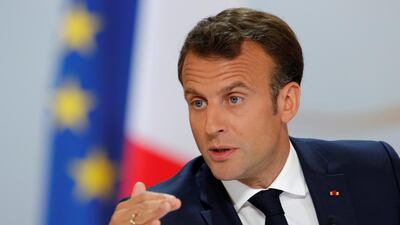French President Emmanuel Macron on Thursday promised significant tax cuts but also a return to public order in France as he responded to almost six months of protests.
In the first formal domestic news conference of his presidency, Mr Macron promised the French a more humane style of governance.
He said he wanted to scrap the elite university ENA, which has produced top French bureaucrats and presidents including himself, but gave no details.
Mr Macron, 41, swept to power in 2017 on hopes that he would be a young breath of fresh air for France.
But over the past six months, momentum has been knocked out of his presidency by the anti-government Yellow Vest (gilets jaunes) movement that has held weekly protests against social inequality.
"I want cuts for people who work by significantly reducing income taxes," Mr Macron said inside the Elysee Palace.
He said the tax cuts would be worth €5 billion (Dh20.45bn) and paid for by longer working hours, reductions in public spending and eliminating corporate tax breaks.
The announcement came after a public consultation programme called the Great National Debate, which was in response to the protests where high taxes were among the main complaints.
Mr Macron defended a decision to scrap a wealth tax early in his term but said it would be reviewed in 2020.
"It was a reform to stimulate production, not a present for the rich," he said.
With Yellow Vests protests continuing every Saturday, Mr Macron warned organisers, whose demonstrations have often turned violent, that it was time for a return to order.
"The transformations that are in progress and the transformations that are essential for our country should not be stopped," Mr Macron said.
He recognised that the protest movement led to "anger and impatience for change" and praised its "just demands".
But Mr Macron said he regretted that the movement had been partly hijacked by episodes of anti-Semitic violence, attacks on journalists and homophobia.
He said the hatred in some of the demonstrations marked a "regression in civic morality and education, and I will fight against it with all my strength."
Mr Macron, sitting alone at a desk at the Palace's vast main reception hall, answered questions from reporters after his speech.
Criticised for often seeming aloof to people's daily concerns, he tried to show a more humble side.
Mr Macron said the second part of his term would be more humane and said he regretted giving a sense of "always giving out orders, being hard, sometimes unfair".
He said he wanted to put the "human being at the heart of the agenda" with a new method of governance.
"We will need to abolish ENA, among others, to be able to build something else," Mr Macron said.
ENA, the post-graduate school that opened in 1945, is regarded as a symbol of French elitism.
Opinion polls show his popularity rating stuck at or under 30 per cent, a far cry from the days after his inauguration when it was more than 60 per cent.
Mr Macron is planning to stand for the 2022 presidential election, knowing that predecessors Nicolas Sarkozy and Francois Hollande only lasted one term and failed to bring in lasting change.
At stake is his ambitious agenda to modernise France and his status as a global statesman who stood up to US President Donald Trump and could lead Europe as German Chancellor Angela Merkel stepped aside and Britain left the EU.
He admitted to differences with Mrs Merkel, including on Brexit where Berlin has taken a tougher line.

